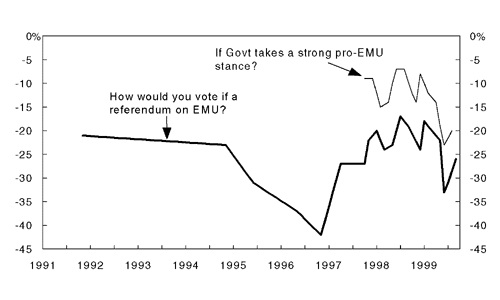EMU tracker, September 1999
Our latest MORI poll suggests that public opposition to EMU entry has fallen a bit from the June/July peaks, but remains above levels seen early this year or in 1998. Thus far, the government's 'softly-softly' approach to EMU - seeking to sway public opinion without giving too strong a lead - has not had much effect.
The coming few months will be the key battle over EMU sentiment. The government will not want to allow EMU to dominate the next general election (expected in about 20 months) if sentiment stays anti-EMU. If EMU support stays low in the next six to nine months then, some time well before the election, the government will let the EMU timetable slip.
The 25bp rate hike highlights both the MPC's activist approach (early rate hikes minimise the eventual peak) and also its current focus on growth, rather than price, data. With growth likely to remain strong, rates probably will rise again in the next few months, unless the pound rises further. Even if the pound slips a bit, rates are likely to peak at about 6% in mid-2000 and then level off - below market expectations.
UK -- Balance of Opinion for the Question: "If there were a referendum now on whether Britain should be part of a single European currency, how would you vote?", 1991 - September 1999
![]() Economic & Market Analysis - Sterling Weekly [pdf format - 92K]
Economic & Market Analysis - Sterling Weekly [pdf format - 92K]
Technical details
Latest survey was carried out between 2-7 September 1999. Sample size 1,957 people. A national representative sample was used and the survey was carried out by face-to-face interviews in the respondent's home.



